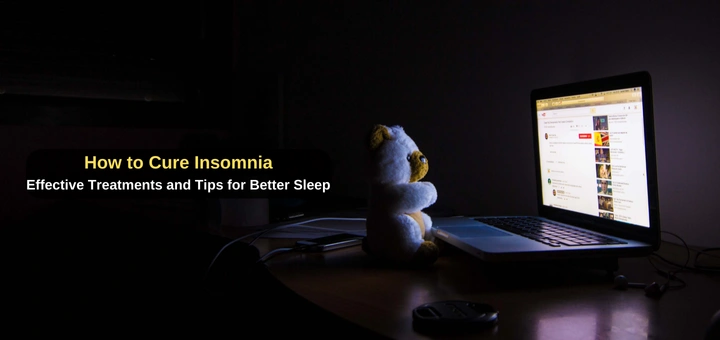Insomnia, a common sleep disorder, affects millions of people worldwide. It can lead to difficulty falling asleep, staying asleep, or waking up too early and not being able to return to sleep. Chronic sleep deprivation impacts not only your physical health but also your mental well-being. In this blog post, we’ll explore the causes of insomnia, available treatments, quick solutions, and therapeutic approaches to help you get a restful night’s sleep.

Why Can’t I Sleep?
Understanding the root causes of insomnia is essential to finding effective solutions. Here are some common reasons why you might be struggling to sleep:
- Stress and Anxiety: Worrying about work, relationships, or life events can keep your mind racing, making it hard to relax and fall asleep.
- Poor Sleep Habits: Irregular sleep schedules, excessive screen time before bed, and consuming caffeine late in the day can disrupt your natural sleep patterns.
- Medical Conditions: Health issues such as chronic pain, acid reflux, or sleep apnea can interfere with your ability to sleep soundly.
- Hormonal Imbalances: Changes in hormones, such as during menopause or due to thyroid issues, can affect sleep quality.
- Medications: Certain drugs, including stimulants and some antidepressants, may cause insomnia as a side effect.
Insomnia Treatments: Exploring Your Options
Fortunately, there are several effective treatments for insomnia, ranging from lifestyle changes to medical interventions. Here are some options:
- Behavioral Changes: Cognitive Behavioral Therapy for Insomnia (CBT-I) is a proven method that helps identify and modify thoughts and behaviors disrupting sleep.
- Medications: Prescription sleep aids, such as benzodiazepines or non-benzodiazepines (like zolpidem), can be used short-term but should be taken under medical supervision.
- Natural Remedies: Supplements like melatonin or herbal teas with chamomile can promote relaxation and support sleep onset.
- Sleep Hygiene: Establishing a consistent bedtime routine, creating a comfortable sleep environment, and avoiding stimulants are essential steps to improving sleep quality.
How to Cure Insomnia in 12 Minutes
If you’re looking for a quick solution to ease insomnia symptoms, try the following 12-minute relaxation technique:
- Find a Quiet Space: Lie down in a dimly lit or dark room.
- Practice Deep Breathing: Inhale deeply through your nose for 4 seconds, hold your breath for 7 seconds, and exhale slowly through your mouth for 8 seconds. Repeat for 5 minutes.
- Progressive Muscle Relaxation: Start at your feet, tensing each muscle group for 5 seconds before releasing. Move upward through your body, focusing on relaxation.
- Visualize Calmness: Imagine a serene setting, like a beach or forest, while maintaining slow, steady breathing.
This method helps calm your mind and body, creating the conditions for sleep.
How Long Should You Use Insomnia Medication?
Insomnia medications are generally intended for short-term use, typically no longer than 2-4 weeks. Long-term reliance can lead to dependency, tolerance, or side effects. Always consult a healthcare professional before starting or stopping any sleep aid to ensure proper management of your condition.
How to Cure Insomnia: Long-Term Solutions
Addressing insomnia in the long term requires a comprehensive approach. Here are steps to cure insomnia effectively:
- Identify Triggers: Determine underlying causes of your sleep problems, such as stress or medical issues, and address them directly.
- Adopt a Regular Sleep Schedule: Go to bed and wake up at the same time every day, even on weekends, to regulate your body’s internal clock.
- Optimize Your Sleep Environment: Ensure your bedroom is cool, quiet, and free from distractions like screens or loud noises.
- Exercise Regularly: Physical activity during the day can promote better sleep, but avoid intense workouts close to bedtime.
- Avoid Stimulants: Limit caffeine, nicotine, and alcohol consumption, especially in the evening.
Sleeping Illnesses and Their Impact
Several medical conditions can interfere with sleep, including:
- Sleep Apnea: A disorder where breathing repeatedly stops and starts, disrupting sleep quality.
- Restless Legs Syndrome (RLS): An uncontrollable urge to move your legs, often during the night, can make it hard to fall asleep.
- Narcolepsy: A condition causing excessive daytime sleepiness and sudden sleep attacks.
If you suspect a sleep disorder, consult a specialist for diagnosis and tailored treatment.
Sleep Therapy: A Professional Approach
Sleep therapy, particularly CBT-I, is highly effective for chronic insomnia. Therapists use techniques such as:
- Sleep Restriction Therapy: Reducing the time spent in bed to match the actual sleep duration, improving sleep efficiency over time.
- Stimulus Control: Creating a strong association between your bed and sleep by limiting activities like reading or watching TV in bed.
- Relaxation Techniques: Guided imagery, meditation, and deep breathing exercises help reduce pre-sleep anxiety.
How Does Diet Affect Sleep?
Your diet can significantly impact your sleep quality. Certain foods and eating habits promote restful sleep, while others may disrupt it. Here’s what you should know:
- Sleep-Friendly Foods: Foods like bananas, almonds, and cherries are rich in magnesium or melatonin, which help regulate sleep cycles.
- Timing Matters: Eating heavy meals or spicy foods close to bedtime can cause discomfort and disrupt sleep.
- Avoid Stimulants: Limit caffeine and sugar intake in the evening, as they can interfere with your ability to fall asleep.
What Are Sleep Cycles and Why Do They Matter?
Understanding sleep cycles can help you optimize your rest. Each cycle consists of four stages, including REM (rapid eye movement) sleep, which is essential for cognitive and emotional health:
- Stage 1: Light sleep as you transition from wakefulness.
- Stage 2: Deeper relaxation, where your body temperature and heart rate drop.
- Stage 3: Deep sleep, crucial for physical recovery and immune function.
- REM Sleep: The dreaming stage, critical for memory consolidation and creativity.
Disruptions to these cycles can lead to fatigue and poor mental performance.
The Link Between Mental Health and Sleep
Sleep and mental health are closely connected. Poor sleep can worsen conditions like anxiety and depression, while mental health struggles can also disrupt sleep. Consider these points:
- Stress and Cortisol: Chronic stress raises cortisol levels, making it harder to relax and fall asleep.
- Anxiety and Racing Thoughts: Anxiety disorders can lead to insomnia by keeping the mind overly active at night.
- Depression and Sleep Patterns: Depression can cause both insomnia and hypersomnia (excessive sleeping).
Therapies like CBT-I or mindfulness meditation can help address both sleep and mental health issues simultaneously.
Can Technology Help You Sleep Better?
While excessive screen time before bed can harm your sleep, certain technologies can promote better rest:
- Sleep Tracking Apps: Tools like Sleep Cycle or Fitbit monitor your sleep patterns and provide insights for improvement.
- White Noise Machines: Devices that produce calming sounds can help mask background noise and promote relaxation.
- Smart Lights: Lights that mimic natural daylight cycles can help regulate your circadian rhythm.
Using technology wisely can enhance your sleep routine and help you understand your unique sleep needs.
What Are Power Naps and Are They Effective?
Power naps are short naps (10–20 minutes) that can boost your energy and alertness without causing grogginess. Here’s how to make them work:
- Keep It Short: Naps longer than 30 minutes may lead to sleep inertia, making you feel disoriented.
- Ideal Timing: Early afternoon is the best time to nap, as it aligns with your natural circadian dip in energy.
- Set the Scene: Nap in a quiet, dark place to maximize relaxation and benefit.
Power naps can be especially helpful for those experiencing midday fatigue or poor nighttime sleep.
Understanding the Role of Circadian Rhythms
Your circadian rhythm is your internal clock that regulates sleep-wake cycles. Here’s how to keep it aligned:
- Sunlight Exposure: Get sunlight in the morning to reset your circadian rhythm and improve alertness.
- Consistent Sleep Schedule: Going to bed and waking up at the same time daily helps stabilize your rhythm.
- Avoid Blue Light at Night: Minimize screen exposure in the evening, as it can suppress melatonin production.
Maintaining a healthy circadian rhythm is key to improving sleep quality and overall well-being.
What Is Sleep Debt and How Can You Recover From It?
Sleep debt occurs when you consistently don’t get enough sleep. Over time, it can affect your health and performance. Here’s how to recover:
- Gradual Recovery: Add 30–60 minutes of extra sleep each night to make up for lost sleep over time.
- Prioritize Quality Sleep: Focus on deep, uninterrupted rest rather than just extending time in bed.
- Healthy Habits: Create a sleep-friendly environment and practice good sleep hygiene to prevent further debt.
Recovering from sleep debt takes patience, but the benefits for your health and energy are worth it.
Can Insomnia Be Prevented?
While some factors contributing to insomnia are beyond your control, proactive steps can significantly reduce your risk:
- Regular Exercise: Physical activity promotes better sleep, but avoid intense workouts close to bedtime.
- Mindfulness Practices: Techniques like meditation or yoga can calm the mind and reduce stress-induced insomnia.
- Avoid Stimulants: Limit caffeine, alcohol, and nicotine, especially in the evening.
By integrating these habits into your daily routine, you can create a strong foundation for consistent, restful sleep.
Conclusion
Insomnia can be a challenging condition, but with the right strategies and support, you can overcome it and enjoy restful sleep. Whether through quick relaxation techniques, long-term lifestyle changes, or professional therapy, there are many paths to recovery. By addressing the root causes and implementing effective treatments, you’ll be on your way to reclaiming the restorative sleep your body and mind need.














